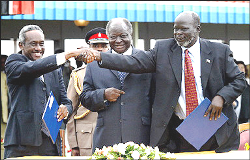Officials: govt will withdraw troops under S. Sudan ceasefire terms
NAIROBI, Kenya, Jan 3, 2004 (AP) — The Sudanese government must withdraw at least 91,000 troops from southern Sudan under the terms of a permanent cease-fire deal it signed with insurgents in an effort to end a 21-year civil war, a rebel official said Sunday.
 The troops have to pull out within 2 1/2 years after the adversaries sign a comprehensive peace deal on Jan. 9 in the Kenyan capital, Nairobi, said Samson Kwaje, spokesman of the rebel Sudan People’s Liberation Army.
The troops have to pull out within 2 1/2 years after the adversaries sign a comprehensive peace deal on Jan. 9 in the Kenyan capital, Nairobi, said Samson Kwaje, spokesman of the rebel Sudan People’s Liberation Army.
Sudanese government and rebel officials on Friday ended two years of peace talks by signing an elusive permanent truce, and endorsed a detailed plan to end the conflict blamed for the death of more than 2 million people.
Under the deals, the national government won’t fund a separate army that rebels plan to maintain in the south as a security guarantee during the transition.
Instead, the proposed government for the autonomous southern Sudan will fund the separate army from its share of oil and tax revenues as well as international aid, Kwaje told the Associated Press.
“It will be a legitimate department of the government of southern Sudan ,” Kwaje said.
The warring sides also agreed that their allied armed groups in southern Sudan must either be disarmed or join rebel and government forces in the next 12 months, said Kwaje and Sayed El-Khatib, spokesman of the government delegation at the southern peace talks.
Rebels wanted this to happen in six months, “but we wanted more time because this is a sensitive issue,” El-Khatib told the AP.
Under the agreement, government and rebel forces will each contribute 20,000 troops who will be retrained to form integrated army units. Those units will be deployed in the south and into any other area the two sides agree on, Kwaje said.
“We also agreed that both armies will be downsized proportionately to peacetime size. This size will be worked out as we move through the interim period,” Kwaje said.
Sudan’s two-decade civil war pitted the government, led by Arab Muslims who dominate the north, against rebels made up mainly of Christians and animists, who are the majority in the south. The conflict is blamed for more than 2 million deaths, primarily from war-induced famine and disease.
United Nations and U.S. officials hope a solution to the civil war in the south will spur an end to the separate conflict between government-backed forces and rebels in the western Darfur region, where disease and hunger have killed 70,000 since March. Nearly 2 million are believed to have fled their homes since the start of the Darfur crisis.
“We concur. That is a priority,” El-Khatib said.
Southern rebels are choosing their representatives to a team drafting a new constitution that will come into force in Sudan before the insurgents join a new government of national unity, Kwaje said.
Representatives of the adversaries, political parties and non-governmental groups must draft an interim constitution within six weeks of Friday’s signing, Kwaje said.
The current Sudanese constitution is based on Islamic law, or Sharia. The charter would be rewritten to ensure Islamic law can be used in the north without infringing on the rights of non-Muslims there or in the south -where the insurgents will run a secular government during the transition period.
The new constitution will take into account eight protocols signed by government and rebel officials during peace talks in Kenya, Kwaje said.
The new charter will clear the way for John Garang, head of the southern rebels, to join a new government of national unity as the first vice president. Garang will also become president of the government of southern Sudan , Kwaje said.
“The existing constitution is Sharia-based … Garang cannot take an oath of office under that constitution,” Kwaje said.
